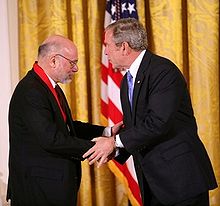
Back الميداليه الوطنيه للعلوم الانسانيه ARZ Medalla Nacional d'Humanitats Catalan National Humanities Medal German Medalla Nacional de Humanidades Spanish National Humanities Medal French המדליה הלאומית למדעי הרוח HE National Humanities Medal Italian Medalha Nacional de Humanidades Portuguese Национальная гуманитарная медаль США Russian National Humanities Medal SIMPLE
| National Humanities Medal | |
|---|---|
 | |
| Awarded for | Exceptional Contributions in the Humanities |
| Location | Washington, D.C. |
| Country | United States |
| Presented by | President of the United States |
| First awarded | 1997 |
| Website | https://www.neh.gov/taxonomy/term/246 |
Ribbon of the medal | |

The National Humanities Medal is an American award that annually recognizes several individuals, groups, or institutions for work that has "deepened the nation's understanding of the humanities, broadened our citizens' engagement with the humanities, or helped preserve and expand Americans' access to important resources in the humanities."[1]
The annual Charles Frankel Prize in the Humanities was established in 1988 and succeeded by the National Humanities Medal in 1997. The token is a bronze medal designed by a 1995 Frankel Prize winner, David Macaulay.[1]
Medals are conferred annually, usually by the U.S. President, to as many as twelve living candidates and existing organizations nominated early in the calendar year. The president selects the winners in consultation with the National Endowment for the Humanities (NEH).[2] NEH asks that nominators consult the list of previous winners and consider the National Medal of Arts to recognize contributions in "the creative or performing arts".[2]
- ^ a b "Awards and Honors". NEH.gov. National Endowment for the Humanities. Retrieved January 23, 2009.
- ^ a b "National Humanities Medals Nominations". NEH.gov. National Endowment for the Humanities. Retrieved March 18, 2012.